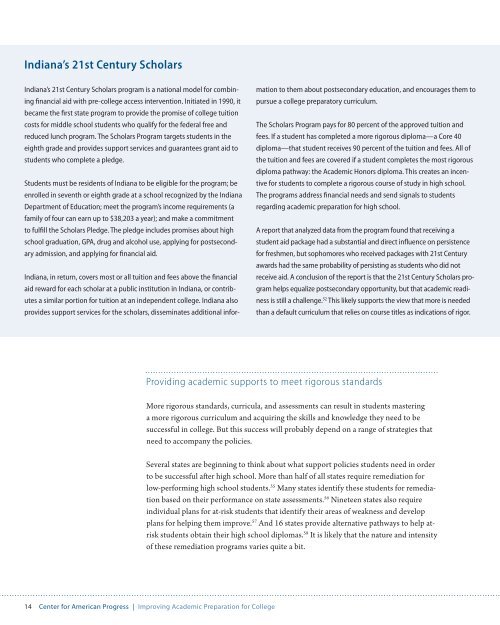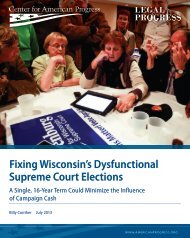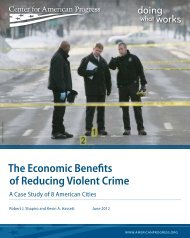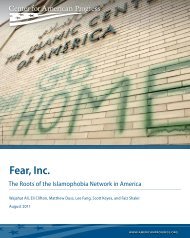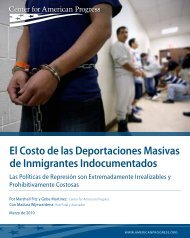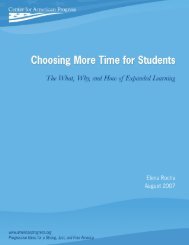Improving Academic Preparation for College - Center for American ...
Improving Academic Preparation for College - Center for American ...
Improving Academic Preparation for College - Center for American ...
Create successful ePaper yourself
Turn your PDF publications into a flip-book with our unique Google optimized e-Paper software.
Indiana’s 21st Century Scholars<br />
Indiana’s 21st Century Scholars program is a national model <strong>for</strong> combining<br />
financial aid with pre-college access intervention. Initiated in 1990, it<br />
became the first state program to provide the promise of college tuition<br />
costs <strong>for</strong> middle school students who qualify <strong>for</strong> the federal free and<br />
reduced lunch program. The Scholars Program targets students in the<br />
eighth grade and provides support services and guarantees grant aid to<br />
students who complete a pledge.<br />
Students must be residents of Indiana to be eligible <strong>for</strong> the program; be<br />
enrolled in seventh or eighth grade at a school recognized by the Indiana<br />
Department of Education; meet the program’s income requirements (a<br />
family of four can earn up to $38,203 a year); and make a commitment<br />
to fulfill the Scholars Pledge. The pledge includes promises about high<br />
school graduation, GPA, drug and alcohol use, applying <strong>for</strong> postsecondary<br />
admission, and applying <strong>for</strong> financial aid.<br />
Indiana, in return, covers most or all tuition and fees above the financial<br />
aid reward <strong>for</strong> each scholar at a public institution in Indiana, or contributes<br />
a similar portion <strong>for</strong> tuition at an independent college. Indiana also<br />
provides support services <strong>for</strong> the scholars, disseminates additional in<strong>for</strong>-<br />
Providing academic supports to meet rigorous standards<br />
More rigorous standards, curricula, and assessments can result in students mastering<br />
a more rigorous curriculum and acquiring the skills and knowledge they need to be<br />
successful in college. But this success will probably depend on a range of strategies that<br />
need to accompany the policies.<br />
Several states are beginning to think about what support policies students need in order<br />
to be successful after high school. More than half of all states require remediation <strong>for</strong><br />
low-per<strong>for</strong>ming high school students. 55 Many states identify these students <strong>for</strong> remediation<br />
based on their per<strong>for</strong>mance on state assessments. 56 Nineteen states also require<br />
individual plans <strong>for</strong> at-risk students that identify their areas of weakness and develop<br />
plans <strong>for</strong> helping them improve. 57 And 16 states provide alternative pathways to help atrisk<br />
students obtain their high school diplomas. 58 It is likely that the nature and intensity<br />
of these remediation programs varies quite a bit.<br />
14 <strong>Center</strong> <strong>for</strong> american progress | improving academic preparation <strong>for</strong> <strong>College</strong><br />
mation to them about postsecondary education, and encourages them to<br />
pursue a college preparatory curriculum.<br />
The Scholars Program pays <strong>for</strong> 80 percent of the approved tuition and<br />
fees. If a student has completed a more rigorous diploma—a Core 40<br />
diploma—that student receives 90 percent of the tuition and fees. All of<br />
the tuition and fees are covered if a student completes the most rigorous<br />
diploma pathway: the <strong>Academic</strong> Honors diploma. This creates an incentive<br />
<strong>for</strong> students to complete a rigorous course of study in high school.<br />
The programs address financial needs and send signals to students<br />
regarding academic preparation <strong>for</strong> high school.<br />
A report that analyzed data from the program found that receiving a<br />
student aid package had a substantial and direct influence on persistence<br />
<strong>for</strong> freshmen, but sophomores who received packages with 21st Century<br />
awards had the same probability of persisting as students who did not<br />
receive aid. A conclusion of the report is that the 21st Century Scholars program<br />
helps equalize postsecondary opportunity, but that academic readiness<br />
is still a challenge. 52 This likely supports the view that more is needed<br />
than a default curriculum that relies on course titles as indications of rigor.


